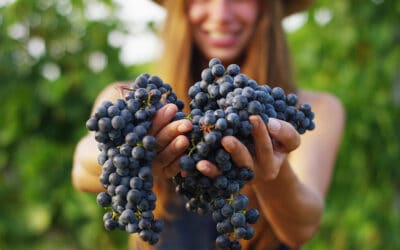
For good reason, Etruscan women and their role in Etruscan society inspired our logo mark.
Etruscan refers to the language, culture, and civilization of the ancient Etruscans. Etruscans are ancient inhabitants of the Valdichiana Senese, which is now modern-day Italy, primarily in the region known as Etruria (modern Tuscany, parts of Umbria, and northern Lazio). They were there in ancient times from around the 8th century BCE to the 4th century BCE, until they were absorbed by the Roman Empire in the beginning of the Middle Ages.
The Etruscans are one of the most enigmatic and fascinating cultures of ancient Italy. The Etruscan people had their own language. Etruscan women are the feminine face of this area of Tuscany.
Not only were the Etruscans accomplished winegrowers who taught the skills of vine-growing (viticulture) and winemaking (viniculture) to the indigenous tribes of Central Italy, we also have plenty of evidence that Etruscan women had a level of independence unlike their Greek and Roman counterparts. Etruscan women were free to attended banquets (aka dinner parties), drink wine, propose toasts at banquets, and could even toast anyone at the party, not just their male relatives — while Greek and Roman women would never be able to raise their glasses in another’s honor because they weren’t allowed to attend banquets, or drink wine.
The role of women wasn’t regarded as the property of their fathers or husbands. Instead, they were literate, kept their own names, raised their own children and children were given their mother’s name. The culture cultivated independent women who were given property ownership. If there wasn’t a male heir, Etruscan women inherited property and even commercial entities, something that was impossible for the women of ancient Greek and Roman culture.
Etruscan women played sports, attended sporting events as spectators, and roamed freely throughout their cities and towns. None of these activities and pastimes were possible for the women of ancient Greece and Rome could pursue. Greek and Roman women were confined not only to their houses, but to certain rooms of their houses.
Greek historian Theopompus (that really was his name!), who lived and wrote in the fourth century BCE, described at length the social customs of Etruscan women. Theopompous was shocked that women attended banquets and toasted anyone in the room and was particularly distressed not only by the presence of women at banquets and parties, but also by the presence of children running and playing at these celebrations.
The independent and brave spirit of Etruscan women inspired our logo as a symbol of both the courageous and strong vigneronnes (women winemakers). We’re honored as part of the wine industry to represent the worldly Etruscan woman via the contemporary women winemakers of Italy and France. It’s an honor to bring these gorgeously expressive natural wines to you, our loyal customers in the United States. We have some of the best wines of Tuscany that salute the Etruscan world!
We’d love to hear what you think of our mission and our logo, and of course, if you’re looking for a French Wine Club or an Italian Wine club, we invite you to learn more about our natural wine memberships.
Salute,
Marilee

Follow us on your favorite social media platform.




0 Comments